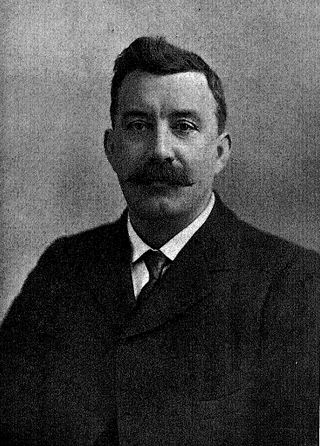Related Research Articles

A stevedore, also called a longshoreman, a docker or a dockworker, is a waterfront manual laborer who is involved in loading and unloading ships, trucks, trains or airplanes.
Arthur Ernest Tiffin OBE, commonly known as Jock Tiffin or A. E. Tiffin, was the third general secretary of the British Transport and General Workers' Union (TGWU). He served for only a few months in 1955 before his death.
The National Transport Workers' Federation (NTWF) was an association of British trade unions. It was formed in 1910 to co-ordinate the activities of various organisations catering for dockers, seamen, tramwaymen and road transport workers.
The Dock, Wharf, Riverside and General Labourers Union (DWRGLU), often known as the Dockers' Union, was a British trade union representing dock workers in the United Kingdom.
The Scottish Union of Dock Labourers was a Glasgow-based trade union for waterfront workers. It was formed during the seamen's and dockers' strikes of June–July 1911. Locally, it replaced the National Union of Dock Labourers, which had been formed in Glasgow in 1889 but later became unpopular in that port, finally closing its local branch in February 1910. The president of the SUDL throughout its lifetime was Joe Houghton. The union joined the Transport & General Workers' Union in 1922, but many of its members left in 1932 to form the Scottish Transport and General Workers' Union (Docks).

The London dock strike was an industrial dispute involving dock workers in the Port of London. It broke out on 14 August 1889, and resulted in victory for the 100,000 strikers and established strong trade unions amongst London dockers, one of which became the nationally important Dock, Wharf, Riverside and General Labourers' Union. The strike is widely considered a milestone in the development of the British labour movement, symbolising the growth of the New Unions of casual, unskilled and poorly paid workers, in contrast to the craft unions already in existence. The strike helped to draw attention to the problem of poverty in Victorian Britain and the dockers' cause attracted considerable public sympathy.
The National Dock Labour Board (NDLB), which administered the National Dock Labour Scheme, was an administrative board for the operation of British docks.
The Battle of Ballantyne Pier occurred in Ballantyne Pier during a docker's strike in Vancouver, British Columbia, in June 1935.

The British Columbia Maritime Employers Association is an association representing the interests of member companies in industrial relations on Vancouver's and other British Columbian seaports.
The Watermen, Lightermen, Tugmen and Bargemen's Union was a trade union in the United Kingdom.
The National Amalgamated Stevedores and Dockers (NASD), sometimes referred to as the National Amalgamated Stevedores' and Dockers' Society, was a trade union in the United Kingdom.

The 2013 Hong Kong dock strike was a 40-day labour strike at the Kwai Tsing Container Terminal. It was called by the Union of Hong Kong Dockers (UHKD), an affiliate of the Hong Kong Confederation of Trade Unions (HKCTU) on 28 March 2013, against contracting companies to whom workforce management had been out-sourced by the Hongkong International Terminals Ltd. (HIT), subsidiary of Hutchison Port Holdings Trust (HPHT), which is in turn owned by Hutchison Whampoa Ltd (HWL), flagship company of Li Ka-shing, Hong Kong's richest man. The strike workers demanded better pay and working conditions. The strike ended on 6 May 2013 when the strikers accepted the offer of 9.8% pay rise. It was the longest running industrial action in Hong Kong in years. Public support and media attention on the strike were unprecedented in the city's history. Some observers marked this as the rejuvenation of political engagement.

Padraig "Paddy" Crumlin is an Australian trade unionist. In addition to his leadership of the Maritime Union of Australia since 2000, he has been the President of the International Transport Workers' Federation (ITF) since 2010 and the International President of the Construction, Forestry, Maritime, Mining and Energy Union since that union was established in 2018.

The Waterside Workers' Federation of Australia (WWF) was an Australian trade union that existed from 1902 to 1993. After a period of negotiations between other Australian maritime unions, it was federated in 1902 and first federally registered in 1907; its first general president was Billy Hughes.
The 1913 Sligo Dock strike in the port of Sligo in northwest Ireland was a labour dispute lasting 56 days from 8 March to 6 May 1913. During the strike, there were numerous clashes on the docks and riots in the town, resulting in one fatality. Occurring six months earlier than the Dublin Lockout, it was regarded as a precursor to that action and a successful application of the Irish Transport & General Workers Union’s strategy for workers rights by James Larkin and James Connolly. It resulted in victory for the workers. James Larkin considered the 1913 victory in Sligo to be a major achievement of the ITGWU.
The South Side Labour Protection League was a trade union organising dock porters and stevedores in the United Kingdom.

Harry Orbell was a British trade unionist.

Thomas McCarthy was a British Irish trade unionist, who became prominent as a leader of dockers in England.

James Anderson was a British trade union leader.
References
- ↑ "Dockers' march during the strike of July 1923. - Port communities". Port Cities. 2012-11-19. Retrieved 2017-08-20.
- ↑ Booth, Janine (2009). Guilty and proud of it! : Poplar's rebel councillors and guardians, 1919-25. Pontypool, Wales: Merlin Press. ISBN 9780850366945.
- ↑ "Home Page".